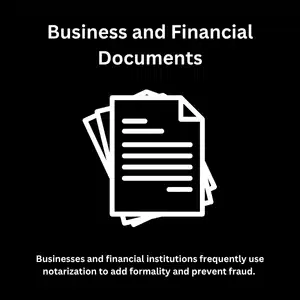
People in Texas often hear about getting documents notarized. But what does this really mean? Notarization is when a notary public watches you sign an important paper. The notary checks your identity and makes sure you sign willingly. Then they add their official seal and signature.
This process makes your document legally binding. It stops fraud and shows that you signed on your own. In Texas, notarization can bind you to an agreement forever. It makes wills stronger and settles property fights. It protects against fake signatures too.
This guide covers notarization basics in Texas. We will show you which documents need a notary’s stamp. You will learn about new online options as well.

A notary public performs notarial acts to add trust to important documents. They verify identity through personal knowledge or ID, witness signed documents, and complete the notarization process with a notary stamp and official seal.
Common examples of a notarized document include deeds, affidavits, and living wills. The process involves ensuring the signer understands and willingly completes the document. A notarized document with notary seals and proper notarial acts wording offers legal weight and protects all parties. Many legal documents require notarization to be legally binding. Notaries also certify copies as a true and correct copy, perform oath or affirmation signature state procedures, and handle document notarization according to local state’s office notarization laws.
Commonly notarized documents include powers of attorney, trusts, and real estate forms. Notarial acts also ensure accurate transcription of statements when necessary. A notarized document carries authority, especially when required by courts or government agencies.
Remote online notarization is an increasingly popular alternative for those needing remote notary services. Whether for institutions or individual capacity needs, examples of a notarized document show how notarization adds credibility. Understanding when to notarize a document helps safeguard legal and financial interests and ensures compliance with relevant laws through your notary public.
Texas notary public laws follow strict rules to protect the notarization process. Each notarized document must carry a notary stamp with the notary’s name, notary’s commission expiration date, and ID. Notaries keep a record book documenting every notarial act performed, including signed documents and identification methods, to prevent fraud and ensure trust. The process involves verifying identity using personal knowledge, ID, or credible witnesses. Personal appearance is required, either in person or through remote online notarization—a popular alternative.
Texas notaries perform various notarial acts: certifying property deeds, wills, medical decisions, and document photocopy certifications as a true and correct copy. Oath or affirmation options must be witnessed—whether a solemnly swear oath to a supreme being or an affirmation state promise to tell the whole truth. Commonly notarized documents include deeds, legal documents, and institutions paperwork. Notary seals and official seal elements make each notarized document legally binding.
Fee caps apply: $10 for most notarization services and $1 per page for copy certifications. However, notaries are not lawyers and cannot offer legal advice or draft legal documents. They only notarize a document and explain the process. For legal questions, always consult a lawyer. Local notarization laws vary depending on jurisdiction. Understanding Texas rules ensures correct handling of documents during document signing or transfer of ownership. A properly notarized document—with verified identity and signature—adds vital trust and legal weight to every important statement and transaction. Each signature and statement must be properly recorded to maintain validity.
Many people are surprised by how many documents need a notary’s stamp. Here are essential examples of notarized documents you should know.

Affidavits are legal documents that serve as sworn statements. To become a legally notarized document, an affidavit must go through the notarization process. During the notarial act done, a notary public administers an oath or affirmation state and witnesses the document signing. The process involves the notary verifying the identity of the individual appearing and ensuring the person understands they are making statement under penalty of perjury.
Examples of notarized documents include affidavits of heirship, domicile, and financial affidavits—often required by institutions or courts. Without proper notarization, an affidavit is not legally valid. A notary applies their notary stamp and official seal, along with the required notarial wording, creating a copy of the sworn statement.
Texas notaries also handle copy certifications for certain documents, verifying them as a true and correct copy. When transfer ownership of property or legal rights is involved, examples of notarized documents such as affidavits or deeds carry special importance. If signing in a representative capacity state, such as for a business or trust, additional notary steps may be required to validate authority.
Notary’s commission details appear on every notarized document to show validity. Whether using remote notarization or in-person services, proper document notarization ensures affidavits meet legal standards. Always follow local rules carefully to maintain compliance and protect the enforceability of these vital documents. Examples of notarized documents prove essential across many legal, business, and personal transactions.
Power of Attorney documents are among the most commonly notarized documents. In Texas, a Durable Power of Attorney for financial matters must be a notarized document to be legally binding. Without it, financial institutions may reject the POA. A Medical Power of Attorney and Living Wills also require notarization or two witnesses. Many choose notarization services to simplify the process and meet local notarization laws.
Texas also requires certain forms—like the Authorization Agreement for Nonparent Care of a Child—to be signed documents notarized by a notary public. Though not required by law, Minor Travel Consent letters are another example of notarized documents often needed by authorities.
When getting any important documents notarized, the notarial act performed ensures a true and correct copy with a proper notary stamp and seal. The notary puts this official verification on the document, offering additional legal protection. A verification on oath confirms that the signer is making the statement truthfully and with full understanding.
Additionally, Power of Attorney documents can play a vital role when you need to transfer ownership of assets or manage financial affairs on behalf of someone else. Ensuring the signature is properly witnessed through notarization services prevents disputes later. A well-executed notarized document, complete with a verification on oath, gives both the signer and recipients confidence in the document’s validity and enforceability. Always verify each signature puts the seal correctly to maintain compliance.
Real estate transactions almost always involve notarization. In Texas, any document affecting real property that you want to record in county records must be notarized. This includes all types of deeds and Deeds of Trust, which are Texas’s version of mortgages.
If you sell your house, the deed transferring title to the new owner must be signed and acknowledged before a notary to be recorded with the county clerk. A deed that is not notarized will not be accepted for recording.
If you take out a mortgage or home equity loan, the loan documents will include notarized forms. Refinancing documents also require notarization for the same reasons.
Ordinary residential leases in Texas do not need notarization by law. However, some commercial leases or long-term leases might be notarized if they will be recorded. Texas law allows recording of leases typically longer than three years.
Real estate is a high-value asset. Documents like deeds and mortgages have long-term legal effects. Notarization provides a safeguard that signers are who they claim to be and ensures no forgery occurred at signing.

Businesses and financial institutions frequently use notarization to add formality and prevent fraud. If you are a small business owner, you may encounter these situations.
Loan Agreements and Promissory Notes get notarized when you borrow money. This is common with larger personal loans, business loans, or private loans. Notarization helps ensure that the borrower actually signed the agreement.
When forming a new business entity, some documents might need notarization. In Texas, if you file an Assumed Name Certificate for a sole proprietorship or partnership, the form often must be notarized. Many counties require the DBA form to be notarized if you mail it in.
Most contracts do not legally require notarization to be enforceable. However, certain contracts include a notary block to add authenticity. Prenuptial agreements in Texas do not strictly require a notary by statute, but it is standard practice to have them notarized.
Banks frequently ask customers to sign certain forms in front of a notary. Examples include forms to open or close accounts for someone else, beneficiary designations for retirement accounts, or lost stock certificate affidavits.
If you are selling a valuable item like a car, boat, or expensive equipment, it is common to use a Bill of Sale and have it notarized. In Texas, a standard private vehicle sale does not require a notarized title. However, if a vehicle is given as a gift, the required Texas DMV form must be notarized.
People often assume that a Last Will and Testament must be notarized. In Texas, a will does not require notarization to be legally valid. However, Texas wills are almost always accompanied by a Self-Proving Affidavit, which does need notarization.
A self-proving affidavit is a separate page where the will maker and witnesses swear under oath that they signed the will properly. The statement is then notarized. This makes the will self-proved. When the will is submitted to probate, the witnesses do not have to come to court to testify.
For Living Trusts or Revocable Trusts, notarization is generally recommended. If the trust will hold real estate, the trust agreement may be notarized so it can be used in title transactions.
Other estate documents that often require notarization in Texas include Designation of Guardian forms, Affidavits of Heirship, and Withdrawal of Claim in estate proceedings.
Advance Healthcare Directives and Medical Powers of Attorney give you the option of two witnesses or a notary. Many people choose notarization to avoid any doubt.
A Texas notary public can make a copy of a document that is not officially recordable. The notary compares the original and a copy, then certifies that the copy is a true copy of the original, ensuring the signature on the certification matches their records.
In Texas, notaries can certify with the important limitation that the original must not be a recordable document. Birth certificates, death certificates, marriage certificates, divorce decrees, court records, or land records are off-limits. Only the issuing government entity can provide official copies of them.
The notary can certify a copy of items like a college degree, power of attorney, letter, or passport. One common use is certifying a copy of a passport for an international application where an original cannot be submitted. The signature is then confirmed on the request and on the certification itself.
It’s important that they ensures the signature provided during the process matches the presenter’s identity and that all notarization steps comply with Texas law. This ensures the certified copy holds proper legal value and is less likely to be challenged. For many personal and business transactions, having a copy with a verified signature adds both credibility and peace of mind.

As of 2025, there is an increasingly popular alternative: Remote Online Notarization. Texas became one of the first states to authorize remote notarization via online audio-video technology in 2017.
Today, Texas allows a commissioned notary public to notarize documents for signers located anywhere using secure video conference. This means you can get a document notarized from your home or office.
In a remote notarization session, you will join a live video call through an approved RON platform. Online notarization has rigorous ID verification. Texas online notaries must use Identity Proofing techniques like knowledge-based authentication. You answer a quiz drawn from public records. You also provide a scan of your ID, which undergoes credential analysis by software.
Once verified, the notary observes you electronically sign the document. The notary then e-signs and attaches an electronic notarial certificate and seal. The entire session is recorded and kept on file for five years.
Remote notarization in Texas carries the same legal weight as in-person notarization. As of early 2023, 43 states have enacted laws permitting remote online notarization. Remote online notarization is here to stay and growing.
For Texans, this means convenience. You no longer have to drive around looking for a notary. Remote notarization is especially useful if you are overseas, in a different state, or homebound.
Here is what you should do to prepare, whether you choose an in-person or remote notary.
Complete the document but do not sign yet. Fill out everything except signatures and notary sections. Do not sign until you are with the notary. Notaries in Texas cannot notarize incomplete documents.
Find a notary. In Texas, notaries are available at banks, credit unions, law firms, shipping centers, real estate offices, libraries, and government offices. Mobile notaries can come to you. Online notary platforms connect you to Texas-commissioned notaries via internet.
Bring proper identification. You need government-issued photo ID such as a driver’s license, state ID card, U.S. passport, or military ID. The ID must be current or issued within the past three years if expired. Make sure the name on your ID matches the name on the document.
Understand the document and sign in front of the notary. The notary will ask if you understand the document and are signing willingly. For jurats, the notary will give the oath or affirmation. You will then sign while the they watch. In Texas, a notary cannot notarize your signature if you are not there in person unless it is online notarization.
The notary completes the certificate. After you sign, the notary fills out the notarial certificate wording. Texas notaries seal the document with their Texas seal near their signature. The signature and seal finalize the notarization.
The notary makes a record book entry. The notary logs the transaction in their journal. In Texas, notaries can charge up to ten dollars per signature. Many office will not charge, but independent notaries might.
After notarization, keep it safe. Once notarized, your document will be accepted for its intended purpose. A notarized document is considered self-authenticating. Protect your notarized documents as you would any important legal paper.
Notarization is a cornerstone of many legal and business transactions in Texas. From deeds to affidavits, from powers of attorney to copies, knowing which documents require a notary’s touch can save you time and hassle.
Always remember that requirements can vary by state. What holds true in Texas might differ elsewhere. Always check local state notarization laws when dealing with out-of-state documents.
With the rise of online notarization, getting a document notarized is more convenient than ever. The notary public acts as an impartial witness, ensuring that a signed document is legitimate and that the signer’s identity and intent are verified. This makes the document trustworthy.
If you have important documents to sign, whether it is a loan, deed, or power of attorney, plan for notarization as part of the process. Getting a document notarized in Texas is straightforward with the right preparation. It offers peace of mind knowing your official documents are executed properly and recognized by the law.
Common examples include deeds and deeds of trust, powers of attorney, affidavits and sworn statements, and many real estate filings intended for county recording. Most ordinary contracts don’t require a notary by law, but some parties add notarization for extra assurance.
A Texas will doesn’t have to be notarized to be valid, but a notarized self-proving affidavit lets the will be admitted to probate without calling witnesses. Estate documents like living trusts (especially those holding real property) are commonly notarized for smoother title and transaction handling.
Texas caps most in-person notarial acts at $10 per notarization, and copy certifications at $1 per page (plus any agreed travel or platform convenience fees). Notaries are not attorneys and cannot provide legal advice or draft documents—they only verify identity, willingness, and proper execution.
Yes—Texas authorized RON in 2017, using live audio-video, identity proofing (e.g., knowledge-based questions and credential analysis), and a notary’s electronic seal with a secure recording retained. You’ll need a device with a camera/microphone, a reliable connection, and a valid government ID; RON carries the same legal effect as in-person notarization.
